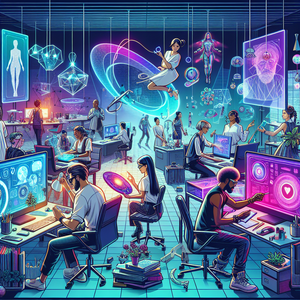
Top 20 In-Demand Jobs and Market Trends for 2025: Navigating the Future of Work
The global job market is evolving at an unprecedented pace as we approach 2025, marked by innovation, sustainability, and a renewed focus on workforce adaptability. With a global Net Employment Outlook (NEO) projected at 25% and key regions, like North County San Diego, reporting robust growth at an impressive 34%, the landscape is ripe with opportunity for both job seekers and employers. Industries such as technology, manufacturing, and renewable energy are at the forefront of this transformation, while the rise of upskilling, remote work solutions, and automation continue to shape the workforce of tomorrow.
Job Summaries:
Data Scientist:
- In our data-driven world, the role of the data scientist remains indispensable.
- These professionals collect and analyze large datasets, extracting insights that guide business strategies.
- Proficiency in Python, R, and machine learning, along with a strong foundation in statistics, is critical.
- As companies continue to rely on big data and AI, the demand for data scientists is set to skyrocket.
Cybersecurity Analyst:
- With cyber threats growing more sophisticated, businesses need experts to protect their digital assets.
- Cybersecurity analysts monitor networks, identify vulnerabilities, and implement robust defense systems.
- Certifications like CISSP or CEH, combined with IT expertise, are highly valuable.
- This role safeguards organizations in an increasingly connected world.
Renewable Energy Engineer:
- As the transition to sustainable energy accelerates, renewable energy engineers are leading the charge.
- They design systems harnessing solar, wind, and other green energy sources.
- A background in engineering and a deep understanding of clean energy technologies are essential for this impactful role.
Electrician:
- Electricians remain integral across industries, from construction to manufacturing.
- Their work includes installing, maintaining, and upgrading electrical systems, with a growing focus on energy efficiency.
- Certifications like the Journeyman Electrician license ensure they’re equipped to meet modern infrastructure demands.
AI Engineer:
- Artificial intelligence continues to revolutionize industries, making AI engineers indispensable.
- These professionals create machine learning models, develop algorithms, and deploy AI-driven solutions.
- Expertise in frameworks like TensorFlow and a strong programming background are key to staying ahead in this cutting-edge field.
Supply Chain Manager:
- Global disruptions and reshoring trends have underscored the importance of resilient supply chains.
- Supply chain managers optimize operations, oversee logistics, and ensure timely delivery of goods.
- Analytical skills, experience in business administration, and familiarity with supply chain software are crucial.
Software Developer:
- Software developers remain at the heart of technological innovation.
- They create, test, and maintain applications that drive industries like healthcare, finance, and retail.
- Mastery of programming languages such as Java, Python, and C++ is essential for professionals in this ever-evolving field.
Financial Analyst:
- Amid economic uncertainties, financial analysts help organizations make informed decisions.
- They evaluate market trends, assess company performance, and recommend strategies for growth.
- A degree in finance or economics, coupled with expertise in financial modeling, is highly beneficial.
Human Resources Specialist:
- The competition for top talent has amplified the importance of HR specialists.
- These professionals design training programs, ensure compliance, and implement retention strategies.
- Strong communication skills and experience with HR software are key for driving workforce development initiatives.
Risk Manager:
- Risk managers play a vital role in identifying potential threats and crafting strategies to mitigate them.
- Their expertise ensures operational stability across industries.
- A background in finance or business, alongside strong analytical skills, is essential for success in this high-stakes role.
Automation Engineer:
- Automation engineers are revolutionizing manufacturing processes, designing robotics systems and optimizing workflows.
- A degree in engineering and hands-on experience with automation tools are critical for excelling in this role, which is central to advanced manufacturing.
Manufacturing Technician:
- The resurgence of manufacturing has increased demand for skilled technicians who operate machinery, troubleshoot equipment, and ensure quality control.
- Technical training or an associate degree in manufacturing technology provides a strong foundation for this hands-on role.
Welder:
- Welders remain indispensable for industries like construction and manufacturing.
- Their work requires precision, technical skill, and certifications like AWS credentials.
- Welders are key contributors to infrastructure development and high-tech manufacturing projects.
Upskilling Consultant:
- As industries evolve, upskilling consultants help businesses future-proof their workforce.
- They design and implement training programs tailored to emerging technologies and market demands.
- A background in education or human resources is a strong asset for this role.
Logistics Coordinator:
- Logistics coordinators are essential in ensuring the smooth movement of goods across supply chains.
- They manage schedules, resolve transportation issues, and track shipments.
- Strong organizational skills and familiarity with logistics software are highly valued.
Healthcare Data Analyst:
- The healthcare industry increasingly relies on data analytics to improve patient outcomes.
- Healthcare data analysts interpret patient data, identify trends, and support policy decisions.
- A background in healthcare or analytics is key for excelling in this impactful role.
Digital Marketing Specialist:
- Digital marketing specialists are critical to brand visibility in today’s online-focused world.
- They develop campaigns, analyze performance metrics, and optimize content strategies.
- Expertise in tools like Google Analytics and SEO best practices is essential.
Robotics Engineer:
- Robotics engineers design and develop systems for sectors like manufacturing, healthcare, and logistics.
- A degree in robotics or engineering and programming skills are vital for driving innovation in automation and robotics.
Biotech Researcher:
- Biotech researchers tackle challenges in healthcare, agriculture, and sustainability.
- They conduct experiments, analyze results, and develop groundbreaking solutions.
- A degree in biology or biotech is the foundation for this fast-growing field.
Remote Work Consultant:
- As hybrid work environments become the norm, remote work consultants help businesses optimize their operations.
- They develop strategies, implement digital tools, and ensure productivity across distributed teams.
- A background in HR or IT is essential for success in this evolving role.
The future of work is brimming with opportunities for those ready to adapt. From the rise of AI and clean energy to the resurgence of manufacturing, these 20 roles exemplify the trends shaping the 2025 job market. Professionals who align their skills with these demands will not only secure rewarding careers but also play a pivotal role in driving progress across industries. For businesses, investing in these in-demand roles is critical to building resilient, forward-thinking organizations. For job seekers, the path to success lies in staying informed, continuously upskilling, and embracing the changes ahead. The future is here—step into it with confidence.
Explore More Jobs
